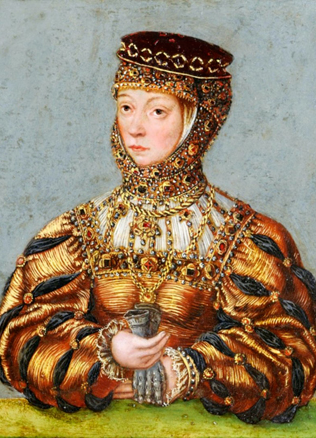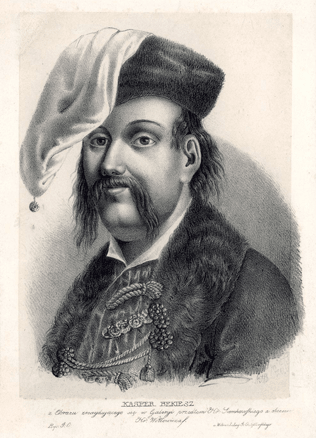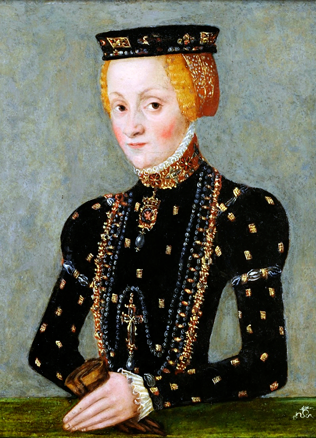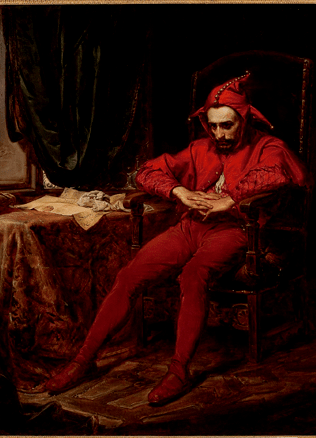The birth of the chancery and the foreign clerks
The Ruler’s chancery, as a governing institution, formed in Lithuania during the rule of Grand Duke Vytautas (1392–1430). It was then that after Lithuania adopted Christianity and the relations with the neighbouring countries improved, conditions for a spread of written culture in Lithuania’s society formed. Lithuanian’s growing authority in the international regional policy made the country maintain regular relations with the rulers and high-ranking officials of different states. Therefore the Grand Duke had to rally a circle of persons around him who could prepare documents for different groups of society inside the country (noblemen, churches, cities) and write letters sent abroad. Thus a group of permanent clerks of the Ruler called secretaries appeared, which constituted the Ruler’s Chancery.
Clerks – the Ruler’s special confidential agents
The multinational character of Vytautas’ state and its geographical position determined the international nature of the Chancery. Documents in the Chancery of the Grand Duke of Lithuania were drawn up and written in the Latin, Ruthenian, German and Czech languages. There are some data about the use of the Arabic alphabet too. Latin and Ruthenian were the main languages. In the long run two parts of the Chancery – Latin and Ruthenian – formed on the basis of this linguistic principle. All the known clerks of the Latin part were foreigners who arrived to Vytautas’ court from Poland, Silesia and the Order. It is not known exactly how Vytautas recruited these people; most probably his good personal relations in Poland and the countries of the Order helped him do that.
“
Latin and Ruthenian were the main languages.
Due to education, knowledge of languages and experience gained (service in the Grand Duke’s court was not the first job in their career) they distinguished themselves among the residents of Vytautas’ court. The Ruler entrusted them not only with preparing documents and letters (that required great confidence, taking into account the Ruler’s illiteracy: letters delivered to him were read, and those written in Latin were translated) but also with other tasks. Embassies were the most important among them, therefore, from the very beginning the Ruler’s Chancery was closely related to the activity of the missions. Clerks accompanied Vytauas’ magnate envoys; they often carried out this mission alone, which required knowledge and a certain social status. All the clerks came from the families of small gentry or town-dwellers, however, the status of the Ruler’s counsellor (Lat. consiliarius) awarded to them raised their status, and the Ruler’s remuneration in cash and land enabled them to climb the ladder of the social hierarchy.
Loyalty of foreigners
The example of this career is Konrad Frankenberg of German origin. He came from Silesia, which was located between Poland and the Czech lands that belonged to the Roman Empire at that time and was germanised. He had served in the Chancery of the Grand Master of the Order. Most probably it was there that he drew attention of Vytautas or any other person from his surroundings. Vytautas knew Konrad Frankenberg’s earlier place of service very well and only the suspicious minds of the historians of the 20th century saw a supposed “spy of the Crusaders” in Frankenberg’s activity. The fact that Vytautas trusted and valued him is testified to not only by the name of a counsellor given to Frankenberg but also by making him knight. After 1410, Konrad Frankenberg was entrusted with governing the Kremenets Castle located in the Ukrainian lands. That was not a deportation of the “German spy” as some historians thought (in that case he would have been dismissed) but Vytautas’ political move taken after assessing the increasing role of Sigismund of Luxemburgin the regional policy. It was through the southern lands of the Grand Duchy of Lithuania that the roads to Hungary ran, there one could collect an information about the activity of Sigismund. There it was possible to keep “political prisoners” too, for example, Švitrigaila who constantly made claims to the throne of the Grand Duke. Konrad Frankenberg was killed in Kremenets during one of the liberation operations organised by Švitrigaila’s associates.
“
Vytautas knew Konrad Frankenberg’s earlier place of service very well and only the suspicious minds of the historians of the 20th century saw a supposed “spy of the Crusaders” in Frankenberg’s activity.
Foreign clerks regarded service in Vytautas’ chancery as temporary. They accumulated their land ownership in their native countries to which they intended to return with the passing of time. Their loyalty, however, did not raise any doubts to the Ruler and it was tested during numerous complicated conflicts. For example, in 1429–1430, when a conflict with Poland in the case of Vytautas’ coronation arose, the Polish clerks of the Grand Duke proved by their deeds their loyalty for which they were blamed by the Polish chronicler Jan Długosz. Vytautas’ clerks who served him longest were Poles Mikołaj Cebulka, Mikołaj Małdrzyk, Mikołaj Sepieński, Bartłomiej from Górka. Their service for the Lithuanian Ruler had a personal nature. None of them remained to continue his service in the court of Vytautas’ descendants. Less is known about the staff of the Ruthenian part of the Chancery. Most probably they came from the lands of the Orthodox countries and mainly dealt with the documents of local significance and by the nature of their activity could not equal the foreign colleagues from the Latin sector who acted on a broad international level.
“Wars of chanceries” or international diplomacy
The international policy, especially the relations with the Teutonic Order, was an important sphere of the activity of these people. The Order’s diplomacy and clerical work of high level was an example to which the Rulers of the Grand Duchy of Lithuania oriented itself. It was not by chance that the new aspect of the activity of clerical work became revealed during the 1409-1411 war with the Order when this conflict acquired the nature of a “war of chanceries”. Still prior to the war both participants in the conflict expressed their attitude towards “the fair war” in their written memoranda seeking to win over the public opinion of Europe. Soon after the battle, Poland and Lithuania organised a propaganda campaign on the large scale, presented Jogaila’s and Vytautas’ “fair” policy in polemic texts and diplomatic missions. New ways of political and diplomatic communication appeared in Poland and Lithuania, and the arguments of educated counsellors were used in a political struggle. This novelty is illustrated by justifying the Tartar squads in the field of the Battle of Grünwald. Support of the “infidels” was perhaps the most important argument in the propaganda battle of the Order for the interpretation of the “fair war”. The Tartars had an indelible image of the “enemies of faith” in Europe a long time ago, and accusation of the alliance with them was a popular discrediting motive. The representatives of Jogaila and Vytautas did not deny the participation of the Tartars but stated that the Tartars could have participated in the battle as the King’s subordinates. The counsellors’ similar argument was formulated in the 1413 dispute over Samogitia. Vytautas’ representative clerk Mikołaj Cebulka, when answering to the Order’s arguments about giving back Samogitia, which were based on the documents of Jogaila and Vytautas, maintained that though the Samogitians were subordinates of these Rulers they were not granted the right to dispose of their lands. Thus a group of counsellors and clerks helped the Rulers formulate the foreign policy and implemented it in practice.
“
Finally, the Chancery was the place where secular culture appeared – historical works (chronicles and annals) and polemic literature (Erasmus Ciołek, Michael Lituanus).
Due to the letters and missions the court of Vytautas was an integral part of the then system of the European courts. Vytautas’ Chancery prepared answers to different addressees who used different languages on time, sometimes the clerks even saw to it that the letters should be translated from rarer languages (for example, requests of the Order’s Masters to translate the Tartars’ letters to them, which they could not understand). Somewhat later the process of the “census” of the authorities on a large scale was started at the Chancery during which a complex of subject writings (codes, regulations, lists) was created, which allowed the state affairs to be handled more rationally.
Finally, the Chancery was the place where secular culture appeared – historical works (chronicles and annals) and polemic literature (Erasmus Ciołek, Michael Lituanus).
Rimvydas Petrauskas



